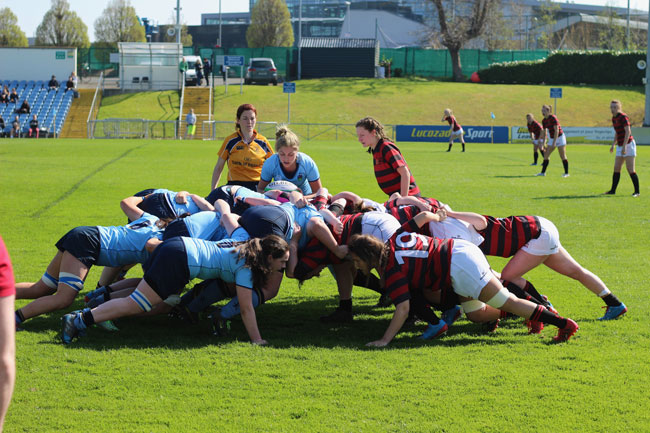Trinity hasn’t always punched at the top tier of college sport, more often eclipsed by its noisy neighbours in Belfield. However, there is undoubtedly a vibrant sporting culture in the College, which is epitomised when walking past College Park on a Wednesday evening and seeing Dublin University Football Club Women (DUFC Women) in full flow, braving whatever the winter elements throw at them. As women’s sport has grown in Trinity over the past decade, the College has produced some world-class athletes. DUFC Women have played no small part in that, with former captain Niamh Byrne representing the Irish sevens team in March. In the past year, Trinity’s female sports clubs have also produced a camogie All-Star, a taekwondo world champion and three under-21 Hockey internationals.
These achievements become all the more impressive when the disparity of funding between men’s and women’s clubs is examined. Documents obtained by The University Times this past week highlighted the alarming gulf in the funds made available to women’s teams by Dublin University Central Athletic Club (DUCAC). The budgets revealed that just one club, Dublin University Ladies Hockey Club (DULHC), received superior funding to their male counterparts this year. In truth, DULHC were the only club allocated anything close to what Trinity’s men’s teams have grown to expect.
Without quality coaching, clubs simply will not progress, becoming trapped in a vicious circle
One of the most concerning revelations from the reports is the enormous disparity when it comes to money made available for coaching purposes. Offenders-in-chief in this regard are Dublin University Football Club (DUFC), who this year were granted a coaching budget of €15,000 – three times that allocated to the women’s side. The documents, which span the budgets of 13 clubs over a four-year period, show that only on five occasions was a women’s club granted a higher coaching budget than their male counterparts. Therein lies the crux of the problem. Almost every successful team in history will credit their success to innovative and creative coaching. It is no secret that competent coaching breeds success: just ask Trinity’s Senior Hurlers. Under the leadership of former Dublin camogie boss Shane O’Brien, they have won back-to-back Ryan Cups, and have competed with the top teams in the Fitzgibbon Cup for the past two years.
However, this top-tier coaching comes at a price, which, based on current allocation, few women’s clubs can afford. The real-world impact of this disparity is that many women’s sides are currently coached by conscientious former members and men’s players, who often give up their own time for free to coach the clubs.
One reason offered by those who attempt to justify the gap in funding is that, with a few notable exceptions aside, Trinity’s men’s teams tend to compete at a much higher level. Even if there existed any measurable correlation between success and funding – which based on the current unclear DUCAC metric, doesn’t appear to be the case – this cannot be a justification for the disparity in spending. Without quality coaching, clubs simply will not progress, becoming trapped in a vicious circle.
Perhaps the most galling part of this story, other than its leaden predictability, is the insidiousness of the problem
In the face of such a blatant disparity, it is perhaps unsurprising that inequality in DUCAC funding is not expressly confined to the grounds of gender bias. In the past three years, there have been serious cuts in most clubs’ budgets as a result of DUCAC’s well-publicised financial problems. Dublin University Association Football Club (DUAFC), for example, have been hit particularly hard during what has been a tumultuous time for the club. However, first among equals when it comes to funding are DUFC, who have been largely insulated from budgetary cuts. For example, DUFC have maintained their coaching budget, which is nearly double that of any other club. This fact becomes all the more perplexing when one considers the deep coffers enjoyed by the rugby club.
The funding they receive from alumni, as well as their entitlement to funding from Bank of Ireland as part of Trinity’s “Focus Sports” program, has allowed them to fund sports scholarships for 30 of their top players. For a club with such deep pockets, it would surely make more sense if DUCAC was to divert a portion of that funding to women’s clubs, whose budgets are dwarfed by DUFC’s.
Despite DUCAC Vice-Chair Róisín Harbison’s insistence in an interview with The University Times that there is no sexism at play in the allocation of club funding, the figures dictate otherwise. Under DUCAC’s model of funding, clubs are allocated finances based on what they ask for, so perhaps there is an onus on female sports clubs to demand more funding with a view to achieving gender parity, but it also behooves DUCAC to do more to address an issue that is endemic in sport globally and try and achieve parity in its funding of men’s and women’s sport in Trinity.
Perhaps the most galling part of this story, other than its leaden predictability, is the insidiousness of the problem. Nobody believes that the gap in funding between men’s and women’s sport in Trinity is down to the malevolence of a DUCAC executive determined to prioritise the growth of men’s sport at the expense of women’s. However, so dishearteningly consistent is the disparity that it is difficult to argue that it is not borne of the belief that women’s sport is not worthy of the same attention as men’s.
Overall, then, DUCAC must continue to take positive steps to help reduce the current disparity, particularly when it comes to coaching. Only when such steps are taken can Trinity really claim to be a college with a “commitment” to equality.







